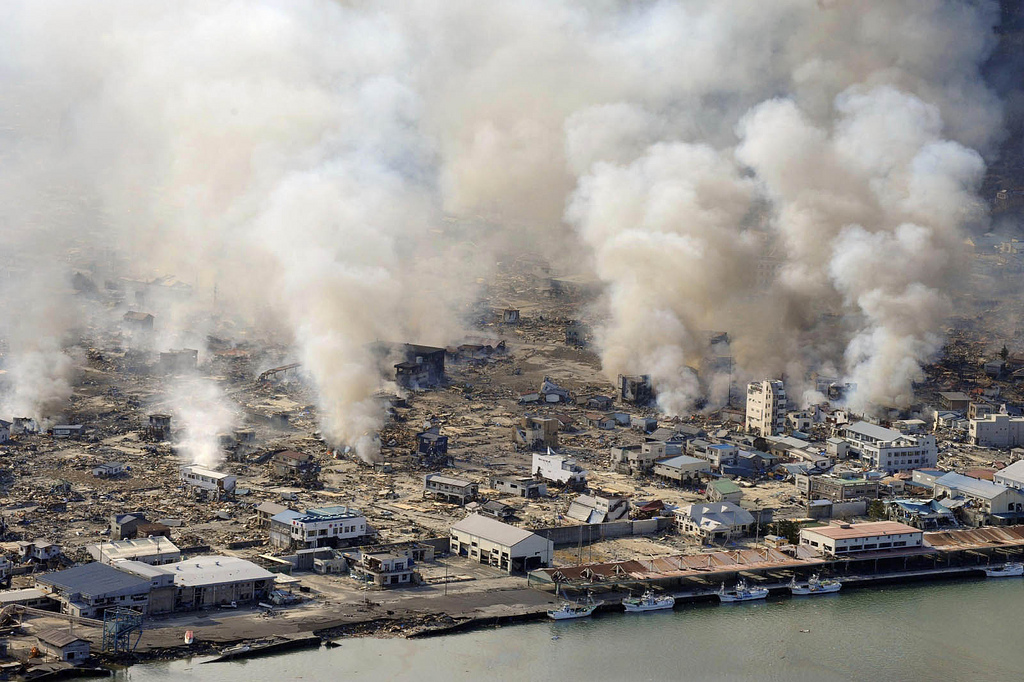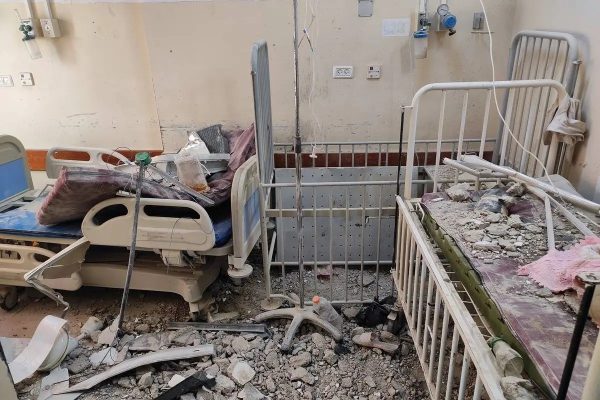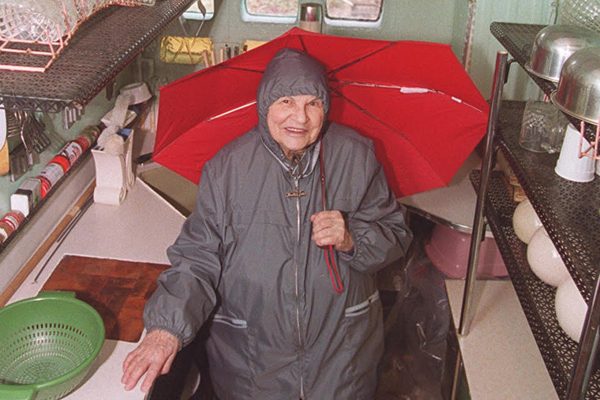It was inevitable that William Vollmann would eventually write about climate change. As a journalist and essayist, Vollmann has reported on war, prostitution, and train-hopping. He has penned a 7-volume treatise on justifications of violence, a 1,300-page investigation of Imperial County, California, and a study of Japanese Noh theater. As a novelist, he has described the European encounter with Native Americans in his Seven Dreams series and examined the Eastern Front of World War II in Europe Central, which won the 2005 National Book Award.
Now, drawing on his longstanding preoccupations with individual morality in the face of historical upheaval and the interaction between humans and the environment, he has written Carbon Ideologies, a two-part examination of global warming and why we cannot seem to do anything to address it.
In the first volume, No Immediate Danger (released April 10), Vollmann travels to Japan after the Fukushima disaster and interviews engineers, activists, and nuclear exiles. In the second volume, No Good Alternative (due to be published June 5), he examines coal, natural gas, and oil by speaking with people whose lives are intimately tied up with fossil fuels in West Virginia, Colorado, Mexico, and the United Arab Emirates.
Vollmann’s reporting is accompanied by lengthy primers on energy production, consumption, and units of measurement, replete with tables and glossaries; he wants his readers to be informed, and he wants them to work at it. At the same time, he writes to future generations, apologizing for the bleak world we are making for them and examining his own complicity with an energy system we cannot seem to shake.
‑Ted Hamilton
Ted Hamilton: When did you start to care so much about climate change?
William Vollmann: I think going to Fukushima in 2011 right after the tsunami and the reactor disaster really made me think. The tsunami looked and smelled horrible. It was awful seeing the stinking mud everywhere, the temporary graves for people who had to wait to be cremated, and the crushed houses. By contrast, the nuclear exclusion zone at that time looked almost as if it were a weekend and people had just gone away for a few days. There were potted plants that had just started to wither, maybe an umbrella that had fallen down in a doorway, or the blinds down, but everything looking pretty intact.
It was only as I started coming back to Fukushima that I saw the weeds growing up through the sidewalks and blinds rattling in the broken windows. Vines were wrapping around signs, and I could hear what was presumably a radioactive boar grunting all over the place. It became a little bit creepier then, especially as I used the pancake frisker [a radiation detector], which allows you to see the radiation. Suddenly the numbers become pictures.
No matter what we write, whether it is science fiction or Carbon Ideologies, we are always writing to and about our own time.
The challenge has been to confront apparent invisibility. A tsunami is very visible, for example. But the radiation is less so. Then you go to a place where there is coal mining, and the effects of climate change are invisible in another way. People deny climate change and they turn their backs on the visible scars of the mining. They do not want to face the acidification of their tap water. And I have certainly found that resource extraction companies want to be invisible. They are very adept at the art of “no comment.”
TH: A big topic in Carbon Ideologies is expert knowledge and the connection between knowledge and responsibility. Having immersed yourself in this material for so many years, how much of your own job do you see as finding the truth and telling the truth?
WV: The process of writing and editing Carbon Ideologies was very different from my previous books. I knew that if I just wrote a rant about climate change, I would not really be helping anybody. There are plenty of those out there. But if I could somehow give people the tools to make their own cost–benefit analysis, then that would be something new.
So I felt constantly under the gun. I was trying to find people to check and double-check everything from arithmetic to assumptions about greenhouse gases. And many sources disagreed. It was very stressful to look at some large number and think, “This is a sextillion, but what if it is really a quadrillion?” I was doing the best I can so that if someone wanted to, he or she could compare emissions per unit volume of coal to oil, or something like that.
But I am not an expert; the math and science stuff does not come naturally to me. What I am decent at doing is describing people’s experiences and motivations. In Carbon Ideologies, I try to talk about the experience or ideology, if you will, of these different fuels.
The people at Fukushima, for example, used to say, “Thanks to Tepco a lot of people in small towns actually have jobs.” And in West Virginia there was a waitress who told me that in McDowell County, “You’re either a coal miner, you work in a prison, or you’re in prison.”
The challenge has been to confront invisibility. A tsunami is very visible, but radiation is less so.
So after Hillary Clinton put her foot in her mouth and said, “We’re going to put a lot of coal miners and coal companies out of business,” why wouldn’t coal mining families in West Virginia vote for Donald Trump? You know, West Virginians used to be mostly Democratic voters. There has to be a way to make people feel that they are being helped to do better instead of penalized.
If I were Hillary, I would have said, “I’m really grateful to the coal miners, the oilmen, and all these people that have given me the electricity that I enjoy. I still use that electricity; I benefit from it. But instead of putting you out of work, let’s make some solar collectors out of Appalachian hardwood that have American flags on them. We’ll help you learn how to make them.”
That would be a win-win. And it would be using the local ideology. We have to understand the terms that people think in. That is why these so-called carbon ideologies are so important to think about.
TH: You address Carbon Ideologies to future readers, and toward the end of the second volume, you even suggest that the book will become just a water-stained relic or a fragment that gets into the hands of the few people who can read. What was behind your strategy to address the book to future readers?
WV: I always liked Thucydides. The poor guy got egg on his face. His military campaign did not go very well. He was in exile for a lot of his life. And so he decided to just write History of the Peloponnesian War, something that he hoped would last for a long time. He described in pseudo-objective terms what had happened and how it affected or mirrored human behavior. I find that approach quite sympathetic.
Of course, no matter what we write, whether it is science fiction or Carbon Ideologies, we are always writing to and about our own time. But had I addressed Carbon Ideologies to today’s readers, I would probably be more prone to despair, because things are not going in the direction that I think they should be going.
By pretending it is two or five hundred years later and saying this is what happened—there is nothing we can do about it now—then it becomes kind of interesting and maybe instructive to examine what our generation did and why we did it. My audience from the future must really hate us, but I want to ask them: would you or could you do any better than we did? If they can’t, it sort of lets us off the hook. But it also makes it all the more hopeless.
TH: Do you think it is important to assign blame for the climate crisis?
WV: I think it is important to assign blame to people who have the power to do better and cut safety corners in the interest of making a buck. The people who delay and refuse to talk—all to our detriment.
The analogy of vaccination is useful here. There are parents who do not vaccinate their children for religious reasons, and they think they have an ideological right. But the problem is that if enough parents do not vaccinate their kids, then they can create a pool of disease that may hurt our kids. When somebody opts out and it is to everybody’s detriment, then we have to ask: where does that person’s right to opt out end?
TH: Which leads to the discussion of control or coercion.
WV: Right. And that is another very, very dismal theme in Carbon Ideologies.
Electric power, after all, is something that we accept almost as a human right. Even if I am willing to fly less and not turn on my air conditioner, what about the poor old lady who is feeble and exhausted. Wouldn’t it be nice if she had some electric help?
That is the real tragedy of the whole thing. The resistance to making progress on climate change is a combination of short-term greed, monetization, frivolous use of electricity, and the legitimate aspirations of poor people to have some of what we have.
But the last thing I want to do is blame ordinary, fairly powerless people for hindering us from stopping climate change. When I was interviewing oil tycoons for the second volume—people such as Sam Hewes, vice president of the Bank of Oklahoma, and Archie Dunham, the former CEO of Conoco—I found myself quite sympathetic to a lot of what they said. Dunham said, “Look, Bill, there are people in the Third World who want to have a hot shower, too, and they are going to do that whether or not we like it.”
My audience from the future must really hate us, but I want to ask them: would you or could you do any better than we did?
I can’t say that he is wrong, and that is discouraging.
When you talk to farmers in the San Joaquin River Delta near Sacramento, for example, they feel very, very bitter about constant regulation. They feel that the regulations never stop. They argue for their individual freedoms, their right not to be regulated. It may be a question of personal rights, but we have to really think: where does a person’s right end?
I very much believe in the freedom of the individual—I would argue for my right to put on a dress if I want to, as I did in the Book of Dolores (2013)—and I don’t want us to turn into some place like East Germany.
With climate change, the longer we wait, the more draconian and centralized the regulations are going to have to be. It is going to be a very, very ugly society.







